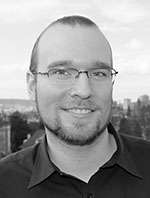
Markus Kolodziej
M.Sc. Biology, 2015, Hauptfach Molekularbiologie
Doktorand im Programm CerealPath, Universität Zürich, Schweiz |
Wie sind Sie an Ihre heutige Tätigkeit gekommen?
Nach dem Abschluss habe ich im Internet nach Ausschreibungen für Doktorandenstellen zum Thema Interaktionen zwischen Pflanzen und Mikroorganismen gesucht. In meiner Masterarbeit hatte ich bereits Kontakt zu diesem Forschungsfeld gehabt, auf der symbiotischen Seite, also beidseitig vorteilhaften interaktion zwischen Pflanze und Pilz. Während es mich durchaus interessiert hätte an diesem Thema weiter zu arbeiten, zog es mich verstärkt auf die gegensätzliche Seite: die Interaktionen von Pflanzen und den diversen Pathogenen, mit denen sie zu kämpfen haben. Glücklicherweise habe ich dann recht bald die Website des «CerealPath» Programms gefunden. |
CerealPath ist ein Marie Skłodowska-Curie Stipendium finanziertes Innovative Training Network Programm (ITN) der Europäischen Union, welches zu diesem Zeitpunkt 15 Doktoranden über ganz Europa verteilt rekrutierte. Es gab verschiedene Projekte zu Getreidepflanzen und ihren Interaktionen mit spezifischen Krankheitserregern, und ich habe mich für zwei oder drei dieser Projekte beworben und nach einem guten Bewerbungsgespräch recht schnell die Zusage für die Doktorandenstelle in Zürich bekommen.
Weiterlesen im BioAlumni-Portal |
|